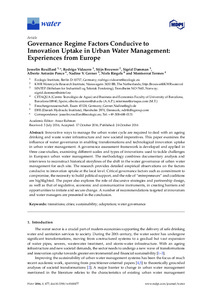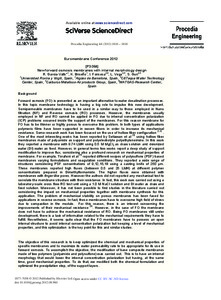CETAQUA - Water Technology Centre
Cetaqua Barcelona is a foundation that was set up in 2007 by Aigües de Barcelona, Universitat Politècnica de Catalunya and the Spanish National Research Council. It is a model of public-private collaboration that was created to ensure the sustainability and efficiency of the water cycle while taking local needs into account. This model has become consolidated as a benchmark in the application of academic knowledge to water and to the environment by creating products and services that benefit society.
Col·leccions
-
Llibres [0]
-
Presentacions [0]
Enviaments recents
-
Governance regime factors conducive to innovation uptake in urban water management: Experiences from Europe

(2016-10-21)
(2016-10-21)
Article
Accés obertInnovative ways to manage the urban water cycle are required to deal with an ageing drinking and waste water infrastructure and new societal imperatives. This paper examines the influence of water governance in enabling ... -
Concentration of seawater reverse osmosis brines using electrodialysis for a zero discharge system

(2012)
(2012)
Article
Accés obertSeawater RO brines have been identified as an alternative to common NaCl sources for the chlor-alkali industry. Electrodialysis (ED) has been evaluated as a preliminary step of NaCl concentration for these brines. -
Hydrogen and oxygen production using wastewater effluent treated with ultra-filtration and membrane distillation (Greenlysis)

(2012)
(2012)
Article
Accés obertCONCLUSIONS: * When MD technology is implemented for wastewater treatment it is important to consider that the presence of ammonia can have an important impact in the final water quality in terms of conductivity. * On-going ... -
Forward osmosis membranes with internal morphology design

(2012)
(2012)
Article
Accés obert -
Sewer odour control: practical assessment of gas phase treatment systems

(2010-09-22)
(2010-09-22)
Comunicació de congrés
Accés restringit per política de l'editorialthe decrease in drinking water consumption, climate change, the evolution of odour regulations and the increased social pressure on olfactory comfort are changes that, nowadays, are leading to increase odour and H2S ... -
Retos en la gestión del agua

(2011-06-17)
(2011-06-17)
Comunicació de congrés
Accés obertEl diseño y la fabricación de los Micro-sensores se llevan a cabo mediante tecnología microelectrónica en Sala Blanca, una instalación de micro y nanofabricación con capacidad de producción a nivel industrial y catalogada ... -
Assessment of flash floods taking into account climate change scenarios in the Llobregat River basin

(Copernicus Publications, 2013-12-06)
(Copernicus Publications, 2013-12-06)
Article
Accés obertGlobal change may imply important changes in the future occurrence and intensity of extreme events. Climate scenarios characterizing these plausible changes were previously obtained for the Llobregat River basin (NE Spain). ...







